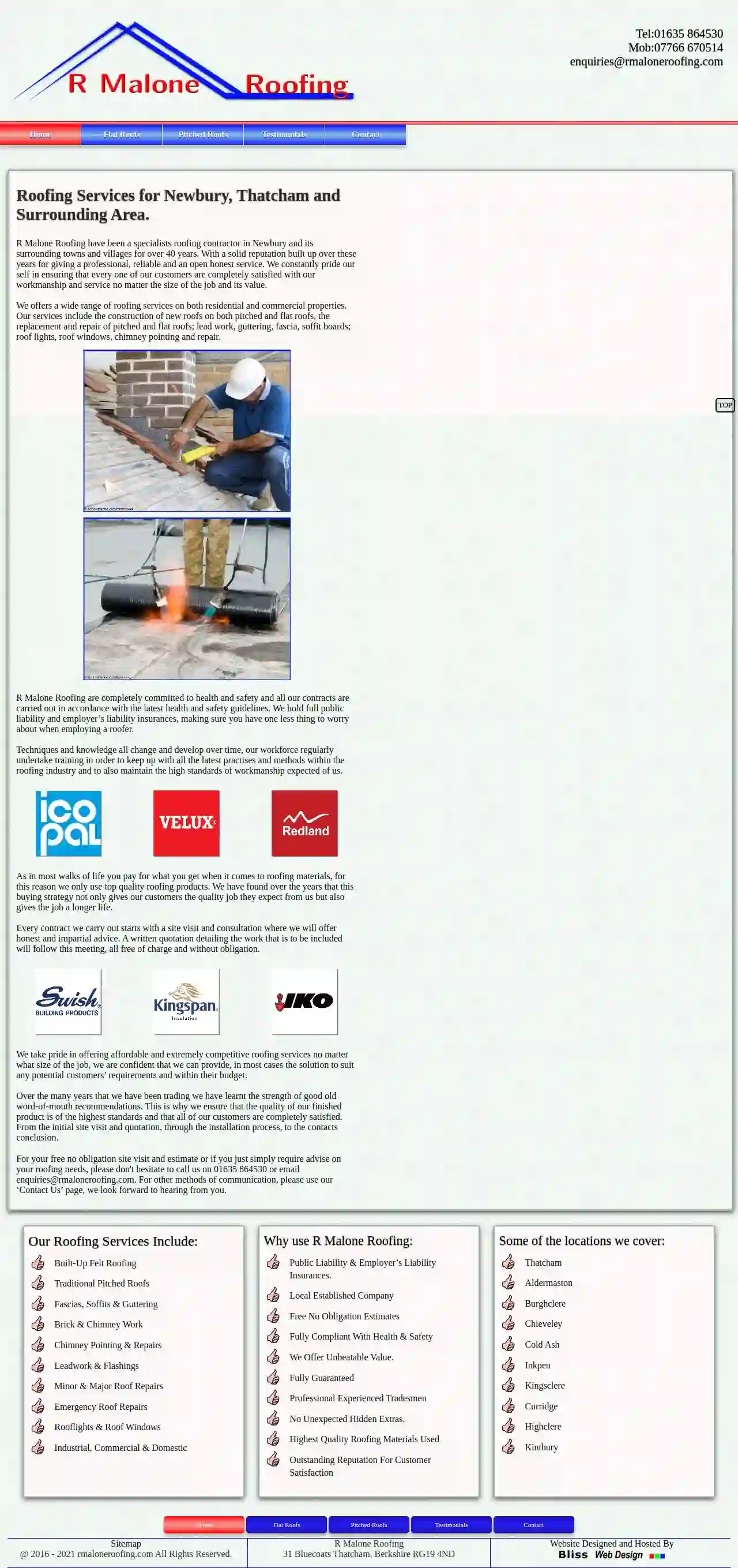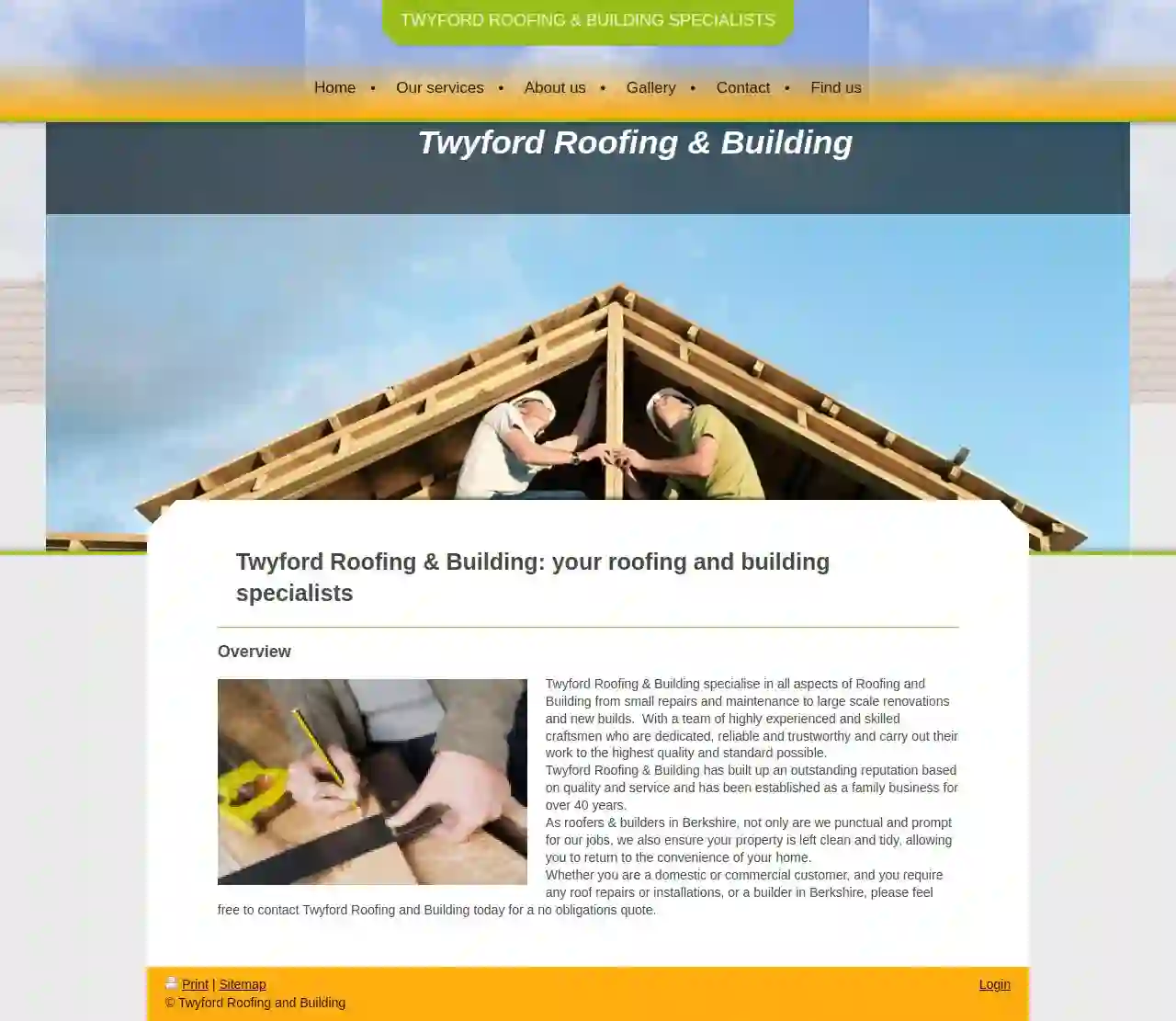Roofing Companies Cold Ash
Best Roofing Companies in Cold Ash
Get multiple Roofing Companies quotes for your project today! Compare profiles, reviews, accreditations, portfolio, etc... and choose the best service.

Valion Roofing
56 reviewsGBAt Valion Roofing, we pride ourselves on delivering exceptional quality work at competitive prices. Our experienced team of professionals is dedicated to ensuring your satisfaction with our services. We offer a range of roofing solutions to meet your needs, from repairs to installations. Contact us today to learn more about how we can help you with your roofing needs.
- Services
- Why Us?
- Testimonials
- Gallery
Get Quote
R Malone Roofing
31 Bluecoats, Thatcham, RG19 4ND, GBR Malone Roofing have been a specialist roofing contractor in Newbury and its surrounding towns and villages for over 40 years. We pride ourselves on giving a professional, reliable and honest service. We are committed to ensuring that every customer is completely satisfied with our workmanship and service, no matter the size of the job. We offer a wide range of roofing services on both residential and commercial properties. Our services include the construction of new roofs on both pitched and flat roofs, the replacement and repair of pitched and flat roofs; lead work, guttering, fascia, soffit boards; roof lights, roof windows, chimney pointing and repair. We are completely committed to health and safety and all our contracts are carried out in accordance with the latest health and safety guidelines. We hold full public liability and employer’s liability insurances. Techniques and knowledge all change and develop over time, our workforce regularly undertake training to keep up with all the latest practices and methods within the roofing industry and to also maintain the high standards of workmanship expected of us. We only use top quality roofing products, ensuring a quality job and a longer life for the roof. Every contract we carry out starts with a site visit and consultation where we will offer honest and impartial advice. A written quotation detailing the work that is to be included will follow this meeting, all free of charge and without obligation. We take pride in offering affordable and extremely competitive roofing services no matter what size of the job. We are confident that we can provide, in most cases, the solution to suit any potential customer’s requirements and within their budget. Over the many years that we have been trading we have learnt the strength of good old word-of-mouth recommendations. This is why we ensure that the quality of our finished product is of the highest standards and that all of our customers are completely satisfied. From the initial site visit and quotation, through the installation process, to the contact’s conclusion.
- Services
- Why Us?
- Gallery
Get Quote
Prestige Roofing Services Ltd
51 reviewsCrowthorne, Berkshire, Unit 1, The Business Centre, RG40 3AA, GBWith over 15 years’ experience in roofing and property improvement services, Realty Roofing is a highly-efficient, reliable roofing contractor providing first class roofing services in Crowthorne and Berkshire, committed to putting you, the customer, first. We will include you in the full roofing process by giving you the opportunity to view any of the work done by our roofers upon its completion, using before and after picture evidence. As part of our high-quality, reliable service we offer a 15 year guarantee with all new roofs we install. We endeavour to deliver on our commitments on time and within budget, using only the best technology, tools and equipment available. We also offer a guaranteed, comprehensive after sales service to answer any questions you may have.
- Services
- Why Us?
- Accreditations
- Our Team
- Testimonials
- Gallery
Get Quote
Bob Shearer Property Maintenance Building & Roofing
51 reviewsAndover, GBNew World Digital Media are making a website here... It will be up and running soon For any enquiries regarding this website, please contact New World Digital Media. Visit Our Website
- Services
- Why Us?
- Gallery
Get Quote
Metcalf roofing
51 reviewsNorthcroft Road, Newbury, Unit 1, The Business Centre, RG14 2AA, GBWith over 15 years’ experience in roofing and property improvement services, Realty Roofing is a highly-efficient, reliable roofing contractor providing first class roofing services in Newbury and Berkshire, committed to putting you, the customer, first. We will include you in the full roofing process by giving you the opportunity to view any of the work done by our roofers upon its completion, using before and after picture evidence. As part of our high-quality, reliable service we offer a 15 year guarantee with all new roofs we install. We endeavour to deliver on our commitments on time and within budget, using only the best technology, tools and equipment available. We also offer a guaranteed, comprehensive after sales service to answer any questions you may have. Our promise to you is this: our roofers are all very friendly and approachable, we promise to try our best to work within your budget where possible, we will go through everything with you regarding proposed work to be undertaken, and only when you are completely satisfied will we commence work. We will do a very professional roofing job and answer all your queries.
- Services
- Why Us?
- Gallery
Get Quote
Pro Fix Roofing & Building
11 reviewsGBAre you looking to improve your home? Create Bigger Beautiful Spaces Through Professional Building Services in Hampshire Our builders will enable you to make the most of the unused space you already have in your home. AREAS SERVED About Hampshire Building Network Your building project deserves the best … Highest standard project management and workmanship Carefully matched to existing building style and materials Compliant with building regulations and codes of practice. Members of the Hampshire Building Network can undertake any construction project in Hampshire, and nothing is too small or too complicated. Be it renovations, woodwork, bathroom and kitchen fitting, extensions and conversions, plumbing or joinery, our approved panel of building contractors are here to build your perfect home using the latest designs, highest quality materials and all of our expertise! Our experienced builders will complete each stage of your domestic or commercial project, from the conception of the plumbing and heating system to the decorations to complicated electrical wiring. If you are looking for local builders in Hampshire, get in touch today. Our members are competitively priced with an excellent track record of customer satisfaction. SERVICES Concept to Completion Naturally, one of the things homeowners worry about when contracting builders for projects such as house extensions in Hampshire is the relationship they’ll build and the professionalism with which they’ll be dealt. Be assured that the level of service, and standard of work carried out by members of the Hampshire Building Network is beyond reproach. About Building Services Include….. Members of the Crew Building Network can help with all manner of domestic and commercial building works. if you would like to see some examples of previous projects carried out, you can take a look at some CASE STUDIES or we would be happy to arrange for you to talk to previous customers. Our members can help with any building project, including: Agricultural Building Basement / Cellar Conversions Brick / Concrete Structural Repairs Cladding New Builds Bricklaying Kitchens & Bathrooms Concrete Garages Concreting Demolition Extensions / Conversions Fire and Flood Renovation Foundations Garage Conversions Garden Studios General Building Loft Conversions New Builds Partition Walls Period Property Restoration Refurbishments Repair and Listed Building Specialist Steel Fabrication Structural Design CASE STUDIES Accrediations Reviews We are proud members of the following bodies
- Services
- Why Us?
- Gallery
Get Quote
Infinity Roofing
GBInfinity Roofing are the team for the job! We cater to all customer needs. We will provide you with a free quote and will also explain and make sure you are aware of all of the options available for the work that needs to be carried out. Our services include but are not limited to: Flat Roofing Slating Tiling Lead Work Guttering Fascia & Soffit Repairs & Maintenance Chimney Pointing Our aim is to save you both time and money by combining our use of roofing knowledge, the highest quality materials and equipment, and our dedication to delivering exceptional service. You will not be disappointed in the quality of our workmanship. Please click on the Facebook link below to view our page!
- Services
- Why Us?
- Gallery
Get Quote
Twyford Roofing & Building
51 reviewsGBTwyford Roofing & Building specialise in all aspects of Roofing and Building from small repairs and maintenance to large scale renovations and new builds. With a team of highly experienced and skilled craftsmen who are dedicated, reliable and trustworthy and carry out their work to the highest quality and standard possible.Twyford Roofing & Building has built up an outstanding reputation based on quality and service and has been established as a family business for over 40 years. As roofers & builders in Berkshire, not only are we punctual and prompt for our jobs, we also ensure your property is left clean and tidy, allowing you to return to the convenience of your home.Whether you are a domestic or commercial customer, and you require any roof repairs or installations, or a builder in Berkshire, please feel free to contact Twyford Roofing and Building today for a no obligations quote.
- Services
- Why Us?
- Gallery
Get Quote
M A Hinton Roofing
3.73 reviewsUnit 1A Little, Ann Bridge Farm, Andover, SP11 7DN, GBMA Hinton Roofing Ltd is a specialist roofing contractor with over 3 decades of experience serving both domestic and commercial clients in Hampshire, Berkshire, and Wiltshire. We offer a comprehensive range of roofing services, including new roof installations, roof replacements, slate and tile roofing, listed building roofing, and more. Our team of skilled and experienced roofers is dedicated to providing high-quality workmanship and exceptional customer service. We pride ourselves on our attention to detail, reliability, and commitment to exceeding client expectations. From small repairs to large-scale projects, we handle every job with the utmost professionalism and care. Based in Andover, we have a long and varied client list that includes private homeowners, self-builders, general builders, property management companies, commercial property owners, and housing developers. We understand the importance of a well-maintained roof and are committed to providing our clients with long-lasting, durable solutions.
- Services
- Why Us?
- Our Team
- Testimonials
- Gallery
Get Quote
Barclays Roofing
4.69 reviewsLondon Road, Reading, RG1 3NZ, GBBarclays Roofing is an experienced roofing company based in Berkshire, offering a wide range of services to the local community. We specialize in new roofs, flat roofs, roof repairs, chimney repairs, roof cleaning and coating, fascias and soffits, and guttering. With many years of experience and hundreds of satisfied customers, we are your local roofing experts. All of our work is fully guaranteed for 10-25 years and insurance backed from the Confederation of Roofing Contractors. Customer satisfaction is key to our business, so we make 100% sure that all your requirements are met and you are completely happy before final payment.
- Services
- Why Us?
- Accreditations
- Our Team
- Testimonials
- Gallery
Get Quote
Over 12,314+ Roofers in our network
Our roofing experts operate in Cold Ash & surrounding areas!
Roofyng.co.uk has curated and vetted the Best Roofing Businesses in and around Cold Ash. Find the most trustworthy contractor today.
Frequently Asked Questions About Roofing Companies
- Home Improvement Loans: Offered by banks or credit unions.
- Home Equity Loans or Lines of Credit: Use your home's equity as collateral.
- Government Programs: Check for energy efficiency rebates or grants.
- Contractor Financing: Some roofing companies offer financing plans.
- Clear the Area: Remove any vehicles, outdoor furniture, or other items from around your house to provide the roofing crew with easy access.
- Protect Landscaping: Cover plants, shrubs, and other landscaping elements near the house with tarps or plastic sheeting to protect them from falling debris.
- Clear the Attic: Remove or cover items stored in your attic, as dust and debris might fall through during the removal of the old roof.
- Notify Neighbors: It's courteous to inform your neighbors about the upcoming roof replacement project, especially if it's likely to be noisy or disruptive.
- Discuss Logistics with the Contractor: Coordinate with the roofing contractor regarding access to your property, parking arrangements, and any special instructions or concerns you have.
- Sagging or Pulling Away: Gutters that are sagging, pulling away from the house, or visibly damaged need repairs or replacement.
- Overflowing Water: If water overflows during rain, it indicates clogs or inadequate drainage.
- Visible Debris: Leaves, twigs, and other debris accumulated in the gutters obstruct water flow.
- Water Damage: Water stains or damage to siding or foundation near the gutters suggest overflow.
- Plant Growth: Plants or moss growing in the gutters indicate standing water and the need for cleaning.
How can I get financing for a new roof?
How often should I clean my gutters?
How do I prepare for a roof replacement?
How can I tell if my gutters need to be cleaned or repaired?
How can I get financing for a new roof?
- Home Improvement Loans: Offered by banks or credit unions.
- Home Equity Loans or Lines of Credit: Use your home's equity as collateral.
- Government Programs: Check for energy efficiency rebates or grants.
- Contractor Financing: Some roofing companies offer financing plans.
How often should I clean my gutters?
How do I prepare for a roof replacement?
- Clear the Area: Remove any vehicles, outdoor furniture, or other items from around your house to provide the roofing crew with easy access.
- Protect Landscaping: Cover plants, shrubs, and other landscaping elements near the house with tarps or plastic sheeting to protect them from falling debris.
- Clear the Attic: Remove or cover items stored in your attic, as dust and debris might fall through during the removal of the old roof.
- Notify Neighbors: It's courteous to inform your neighbors about the upcoming roof replacement project, especially if it's likely to be noisy or disruptive.
- Discuss Logistics with the Contractor: Coordinate with the roofing contractor regarding access to your property, parking arrangements, and any special instructions or concerns you have.
How can I tell if my gutters need to be cleaned or repaired?
- Sagging or Pulling Away: Gutters that are sagging, pulling away from the house, or visibly damaged need repairs or replacement.
- Overflowing Water: If water overflows during rain, it indicates clogs or inadequate drainage.
- Visible Debris: Leaves, twigs, and other debris accumulated in the gutters obstruct water flow.
- Water Damage: Water stains or damage to siding or foundation near the gutters suggest overflow.
- Plant Growth: Plants or moss growing in the gutters indicate standing water and the need for cleaning.